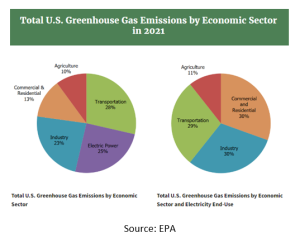
National Energy Awareness Month: Time to go greener?
In October, we celebrate National Energy Awareness Month, a dedicated time to focus on the importance of energy in our daily lives and the critical role it plays in our future. It’s a good moment for companies to reflect on sustainability goals and how they are going to achieve their goals.
The fuel industry has long been associated with environmental challenges due to its significant contribution to greenhouse gas emissions. In the United States alone, fuels account for 28% of total greenhouse gas emissions. Laws and rules about transportation are increasingly linked to climate concerns as everyone works towards cutting carbon emissions. But it’s not just governments driving this change – investors, customers, banks, employees, and society in general are all pushing for greener transportation.

The Benefits of Green Fleets
For businesses that are consumer-facing, maintaining a clean and sustainable image has become essential. According to the Business of Sustainability Index conducted by Greenprint, 74% of US consumers are willing to spend more on sustainable products when compared to less sustainable options.

Major corporations like Walmart, UPS, and FedEx have also recognized the importance of sustainability and have made significant investments in green fleets. These green fleets often utilize alternative fuel vehicles, including renewable diesel, compressed natural gas (CNG), and electric vehicles, to improve their brand image.
However, sustainability initiatives are not limited to consumer brands. Business-to-business companies are also embracing sustainability for various reasons. Some states, such as California, have implemented emissions standards that companies must meet. Others offer incentives for adopting green technologies. Moreover, many companies are using their green initiatives as a recruiting tool, attracting young talent concerned about climate issues. This is especially critical in an industry like trucking, where there is a shortage of drivers, and millennials are less inclined to pursue traditional trucking careers.
Going green can also serve as a competitive differentiator in industries like construction and waste management. Construction companies that can showcase their use of alternative fuels or reduced emissions are more likely to stand out in the bidding process. Similarly, for-hire trucking companies and others can gain a competitive edge by promoting their commitment to sustainability.
Solutions for Green Fleets
Biofuels: Biofuels like ethanol, biodiesel, and renewable diesel are alternatives that can reduce a fleet’s carbon footprint. You can learn more about biofuels here.
Ethanol is an alcohol-based biofuel primarily made from the fermentation of sugars found in crops like corn and sugarcane. One of its significant advantages is that it can be blended with gasoline, typically up to 10% ethanol in the case of standard E10 gasoline. However, higher ethanol blends, such as E85 (85% ethanol), are also available for flex-fuel vehicles.
Biodiesel, on the other hand, is derived from vegetable oils, animal fats, or recycled grease. It can be blended with traditional diesel fuel up to 20% in most cases without the need for engine modifications. Biodiesel can reduce greenhouse gas emissions compared to conventional diesel fuel, as it is produced from renewable sources and has lower sulfur content.
Renewable Diesel stands as a highly promising option for fleet operators seeking to make their operations more environmentally responsible and sustainable. Its emissions-neutral properties, compatibility with existing diesel infrastructure, and ability to meet diesel fuel specifications make it an attractive choice for reducing the carbon footprint of diesel-powered vehicles. As a “drop-in” replacement for diesel, RD can be used as a direct replacement for diesel fuel, reducing emissions by up to 70%.
Compressed Natural Gas (CNG): CNG was once hailed as a disruptor in the industry but faced challenges when oil prices dropped. If fuel prices rise again, CNG may regain popularity.
Electric Vehicles (EVs): Although electric vehicles are currently cost-prohibitive, they are seen as a future disruptor. As battery technology advances and charging infrastructure improves, EVs are expected to become a cost-effective choice.
Clean Energy Experts
Are you searching for the right biofuel blend to meet your sustainability goals? Look no further! Mansfield provides customers with a wide range of biofuel blends — from biodiesel and renewable diesel to ethanol — to meet all your needs.
Contact the clean energy experts at Mansfield today to learn how to take the guesswork out of your sustainability goals.

This article is part of Daily Market News & Insights
Tagged:
MARKET CONDITION REPORT - DISCLAIMER
The information contained herein is derived from sources believed to be reliable; however, this information is not guaranteed as to its accuracy or completeness. Furthermore, no responsibility is assumed for use of this material and no express or implied warranties or guarantees are made. This material and any view or comment expressed herein are provided for informational purposes only and should not be construed in any way as an inducement or recommendation to buy or sell products, commodity futures or options contracts.





